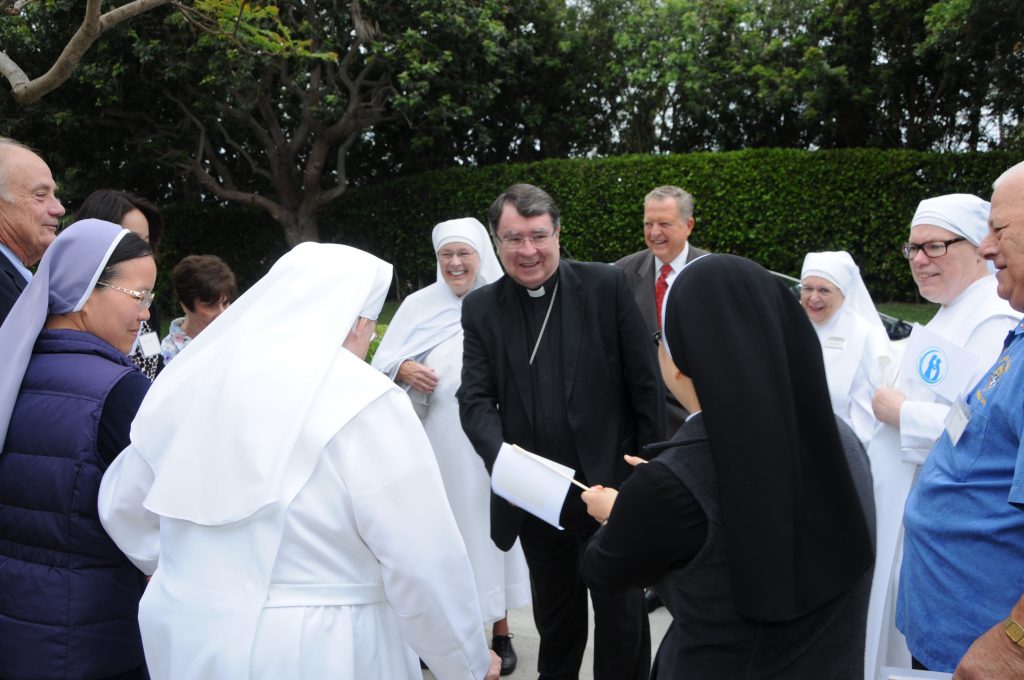St. Jeanne Jugan is an impossible saint. Born during the French Revolution, where the Church was ravaged by the Enlightenment, and orphaned at an early age, she still managed to get educated in the faith by unknown brave women and then, in 1839, found her calling to take care of the elderly who were destitute and without any place else to go.
But I guess she is no more “impossible” than a young French maid leading an army to victory against the invading English.
For 150 years, the order the “impossible” St. Jeanne Jugan founded, the Little Sisters of the Poor, has been doing the impossible in the United States.
Since 1905, the sisters have been taking care of the elderly poor in the Archdiocese of Los Angeles.
A signpost pointing in the direction our wayward culture is zig-zagging, most people who have any idea of the name “Little Sisters of the Poor” associate the sisters with the Obama-era lawsuit against the federal government over the birth control mandate included in the name of health care reform.
We’ve all seen the photo of these nuns on the steps of a government building in their white habits. Some may misinterpret this image as a quaint and even cute relic of the past. In fact, these nuns are representations of the past, present and future and have done so through a staggering demonstration of faith.
I recently had the honor of visiting the Little Sisters of the Poor, and in preparation for my visit, I did a little research, which led me to the story of the foundress, St. Jeanne Jugan, and some other historical nuggets, such as how St. Teresa of Calcutta stayed with the Little Sisters of the Poor when she first came to Calcutta before founding the Sisters of Charity.
But the most profound thing I learned was how the order has flourished since 1839 — the year Martin Van Buren was president, if you need some historical context.
Since the beginning, the order has had the same economic model and the same mission: giving the elderly poor a dignified and loving place to call home.
Due to my day job, I have intimate knowledge of how nonprofits — especially religiously affiliated nonprofits — operate, and it isn’t anything like the way the Little Sisters of the Poor operate.
In the “normal” world, major nonprofits maintain a network of intricate fundraising mechanisms that, in the case of the Archdiocese of Los Angeles, sustain its schools, parishes and programs to assist the poor — all things that dioceses are supposed to do.
Many of the mechanisms take the form of long-term revenue generators like annuity programs, planned giving, endowments and all manner of investments designed to give a worthy cause the reliable sources of income to keep the lights on and the doors open.
It is not a bad policy. The New Testament is all about being prepared. You better have enough oil in your lamp, and if your master gives you a few spare talents, you better turn that investment into something more or else.
The sisters have a financial theory and plan that could fit on a cocktail napkin and one that also has biblical foundations.
You might say it is an impossible financial structure. From its inception, the order has managed no long-term financial plan, no planned giving department, no endowment … nothing.
The sisters rely on Providence for financial backing. They go about their mission of taking care of the marginalized in every culture — the order exists in more than 30 countries around the globe — and they do so with full faith and confidence in the economic prowess of Providence.
No, they don’t pray for the newest Falcon Private Jet, just the resources to do what God put them on earth to do.
This was the only economic model this “impossible” saint relied on and the same model the Little Sisters of the Poor implement today. Moses just had to tap that rock twice, and look where that got him.
A Harvard MBA would recoil in horror at this kind of financial planning, and in our practical and possible world where we are constantly looking for the warranty and the guarantee, we are blind where the Little Sisters of the Poor see so well.
It all sounds impossible … except with God, it isn’t.
Interested in more? Subscribe to Angelus News to get daily articles sent to your inbox.
